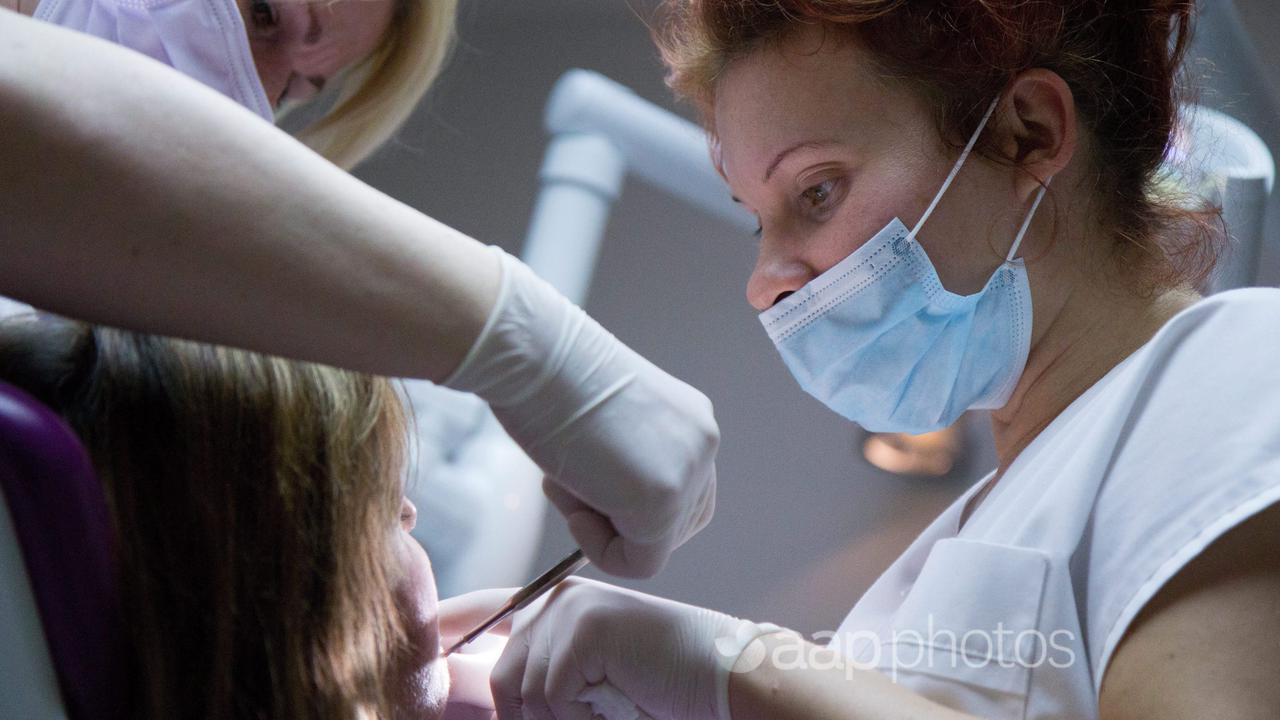A widely shared Facebook post claims that a root canal is toxic to the body and linked to cancer and chronic illnesses.
However, dental experts told AAP FactCheck this is another attempt to promote a near-100-year-old discredited theory that has been debunked repeatedly for more than 60 years.
The post, originally written in 2018 by a New Zealand woman, describes going to a dentist to get a tooth that had a root canal procedure done eight years prior extracted.
“I told her about the overwhelming scientific PROOF that root canals are extremely toxic to the body, and that 90% of Cancer patients have them in their mouth. And that chronic illnesses of ALL kinds (especially autoimmune related) have been scientifically linked to root canals,” the post reads.
The woman claims she also had an autoimmune condition for the past eight years, but that “the Dentist argued with me that (the tooth) didn’t need extraction”. The post was reshared this month here and here.
Root canal treatment, also known as endodontics, involves treating the dental pulp, a delicate structure containing nerves and blood vessels inside the hard tooth also sometimes known as the “tooth nerve.”
The treatment removes inflamed or infected pulp – which is not essential in mature adult teeth – and then fills and seals the space.
Experts dismissed the post’s claims as “nonsense”. They said it originates in a largely discredited old dental theory called “focal infection”, a hypothesis that some infections in a specific part of the body may cause symptoms throughout the body.
“This ‘focal infection’ nonsense has been ongoing for over a hundred years, so it is not new to us in the dental profession,” Professor Ove Peters, an endodontics specialist at the School of Dentistry at the University of Queensland, told AAP FactCheck via email.
The theory stems from the work of Dr Weston Price (1870-1948), a dentist and nutritionist who promoted the idea of removing infected teeth entirely rather than treating them with root canals, including in a 1923 book.
The focal infection theory in dentistry was popular in the early 20th century, said Professor Peter Parashos of the Melbourne Dental School, University of Melbourne.
“This erroneous and extreme concept culminated in the indiscriminate mass extraction of teeth in the 1910s to 1930s, in an attempt to cure patients of their non-dental ailments,” he said in an email to AAP FactCheck.
Opposition to focal infection can be traced back to at least 1940.
“The archaic concept that all non-vital teeth, whether satisfactorily treated or not, can cause a myriad of systemic diseases and disorders has been discredited by a large volume of scientific evidence throughout the last century,” Prof Parashos said.
Prof Peters agreed, adding: “Collectively, contemporary evidence demonstrates that the risk for diseases caused by bacteria escaping in the case of residual infection in root canal treated teeth, a concept also known as focal infection theory, is exceeding small.”
The American Association of Endodontists also strongly criticised Dr Price’s work in their publication, “Root Canal Safety“, saying: “(Price’s) theory resulted in a frightening era of tooth extraction both for treatment of systemic disease and as a prophylactic measure against future illness”.
“This false claim was based on long-debunked and poorly designed research conducted nearly a century ago, long before modern medicine understood the causes of many diseases,” the AAE says on its website.
“There is no valid, scientific evidence linking root canal treatment to disease elsewhere in the body.”
In 1951, the Journal of the American Dental Association (JADA) published an entire issue dedicated to refuting focal infection. JADA “reviewed Dr Price’s research techniques from the 1920s and noted that they lacked many aspects of modern scientific research, including absence of proper control groups and induction of excessive doses of bacteria,” the AAE states.
Dental treatment has improved considerably in the nearly 100 years since Dr Price’s work was published. “Progresses in periodontology and endodontics allow controlling oral infections without removing dental elements,” a 2020 report in the Journal of Microbiology said.
Prof Peters said the nature of root canal treatment keeps infection to a minimum, and the body’s own defences typically prevent problems.
“If bacteria are left in root canal treated teeth, the space that they are given is exceedingly small (this is why we fill canals after root canal treatment). In case some bacteria escape the root canal system, they meet the immune defence in the surrounding bone, which is specifically equipped for the purpose of destroying bacteria.
“Our immune system is so efficient, that bacteria pushed into the tissues around teeth during regular tooth brushing will be eliminated in the course of 30 seconds.This actually happens to all of us (who brush teeth) every day.”
Prof Parashos added: “Root canal systems once cleaned, shaped, disinfected and filled create a sealed system.”
One of the claims that the Facebook post makes is that after a root canal a periodontal ligament – tissue which connects the tooth to alveolar bone – is left as “dead tissue INSIDE the body”. Prof Parashos said that claim is “biologically incorrect”.
“To refer to root canal treated teeth as ‘dead’ teeth is incorrect because the tooth still receives a blood supply from the periodontal ligament (PDL) surrounding the root, which is not “necrotic” after root canal treatment,” he wrote.
Claims that people who have had root canal treatments also later had cancer do not actually make any kind of causal link, experts say.
“Some people who have cancer may have had a root canal treatment at some point in their life,” a 2020 medically reviewed article in Medical News Today said. “This does not mean that the root canal procedures had anything to do with the development of cancer.”
“The approach has been debunked too many times to count,” Prof Peters said. “At the same time is very important to address as this misconception … severely compromises oral health for many people.”
Prof Parashos said: “The claim that all endodontically treated teeth are a focus of infection and must be extracted in order to cure the patient of their systemic diseases is indefensibly unethical and incorrect”.
The Verdict
The theory that extracting any infected tooth is safer than root canal therapy has been circulating for nearly 100 years, but was widely discredited as far back as the 1950s. A root canal creates a closed system, and if the procedure is done properly is safe, experts say.
False – The claim is inaccurate.
* AAP FactCheck is an accredited member of the International Fact-Checking Network. To keep up with our latest fact checks, follow us on Facebook, Twitter and Instagram.
All information, text and images included on the AAP Websites is for personal use only and may not be re-written, copied, re-sold or re-distributed, framed, linked, shared onto social media or otherwise used whether for compensation of any kind or not, unless you have the prior written permission of AAP. For more information, please refer to our standard terms and conditions.


















